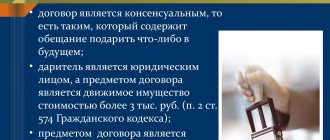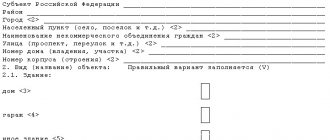Legal nature of a lifelong maintenance agreement with dependents
A lifelong maintenance agreement with a dependent is a subtype of a life annuity agreement, therefore, according to paragraph 2 of Article 601 of the Civil Code of the Russian Federation, it is subject to all the provisions of paragraph 3 of Chapter 33 of the Civil Code of the Russian Federation, as well as the general provisions of paragraph 1 of this chapter, including on notarization of the agreement, encumbering real estate with rent, ensuring payment of rent and liability of the payer for late payments.
Under a lifelong maintenance agreement with dependents, a citizen (rent recipient) transfers his residential house, apartment, land plot or other real estate into the ownership of the rent payer, who undertakes to provide dependent maintenance, which may include: meeting the needs for housing, food and clothing, and if the citizen’s health condition requires it, so does his care.
The contract must determine the cost of the entire amount of maintenance with a dependent, while this cost (per month) under a contract of lifelong maintenance with a dependent, providing for the alienation of property free of charge, cannot be less than two established in accordance with Federal Law of October 24, 1997 No. 134- Federal Law "On the subsistence level in the Russian Federation" of the subsistence level per capita in the corresponding constituent entity of the Russian Federation at the location of the residential premises that are the subject of the contract (clause 2 of Article 602 of the Civil Code of the Russian Federation as amended by Federal Law dated November 30, 2011 No. 363-FZ).
Article 411 of the Civil Code of the Russian Federation contains an important provision that claims related to lifelong maintenance with a dependent are not subject to offset. Therefore, the annuity payer does not have the right to offset against the annuity payable to its recipient any debts of the latter to him (for example, under a loan agreement).
Benefits of the annuity recipient under the agreement
The list of material goods, services and the cost of monthly assistance due to the annuity recipient under a lifelong maintenance agreement are essential terms of the agreement.
Thus, the benefits and services received may include:
- provision of food, clothing, medicines;
- covering utility costs;
- cleaning the house;
- medical service.
In addition, the annuity recipient may claim part of the annuity in the form of monetary compensation.
Subjects of a lifelong maintenance agreement with dependents and cases of its invalidation
According to Article 601 of the Civil Code of the Russian Federation, the parties to such an agreement are the payer and the recipient of rent (maintenance), while only citizens can be recipients of maintenance (as a rule, these are single, sick, low-income citizens of retirement age).
Rent payers can also be public entities, such as the state and local governments, on behalf of which are the relevant bodies that have specially created services that provide social services to single citizens and disabled people (cleaning the apartment, cooking, various medical and transport services for imprisonment). lifelong maintenance agreement with dependents.
On the territory of the city of Moscow there is a state unitary enterprise “Moscow Social Guarantee”, which organizes social services for people with disabilities and pays them a life annuity (additional pension). Often this body acts as a defendant in claims for the termination of lifelong maintenance agreements with dependents, as well as in claims for invalidation of a lifelong maintenance agreement with dependents, for example, on the basis of Article 177 of the Civil Code of the Russian Federation, since the lifelong maintenance agreement was signed during a period of illness when there was no opportunity to correctly navigate in a certain environment, and the plaintiff was not able to understand the meaning of his actions and manage them (decision of the Babushkinsky District Court of Moscow dated July 5, 2013 in case No. 2-272/13).
Differences between annuity contracts
In order not to make a mistake in choosing the type of contract, it is worth considering the differences between them.
Condition | Life annuity | Perpetual annuity | Maintenance and dependency |
| Annuity recipient | Individuals | Individuals and non-profit organizations | Individuals |
| Type of property | Cash, real estate, cars | Cash, real estate, cars | Residential Properties |
| Rent term | Limited by the life of the annuitant | Is not limited | Until the death of the recipient |
| Transfer of obligations by inheritance | Not getting through | Transmitted | Not getting through |
| Change of annuity recipient | Impossible | Allowed | Not allowed |
| Rent payment method | Cash, food, care, maintenance, apartment cleaning services | Cash and bank transfers, care services, cooking | Care and service for an elderly person: cleaning the apartment, cooking, feeding, accompanying to the hospital, care during illness |
| Frequency of rent payment | Monthly | Quarterly | Monthly or daily |
The burden of bearing the costs of paying for housing and communal services
In our opinion, according to the general rule established by Article 602 of the Civil Code of the Russian Federation, all costs for housing and communal services, including costs for major repairs of housing transferred for the payment of monthly maintenance with a dependent, are borne by the rent payer.
In addition, after receiving a certificate of ownership of residential premises from the Federal Registration Service, the personal account for payment of housing and communal services is subject to re-registration by the cash settlement organization in his name as the new owner of the housing. This position is based on the fact that, in accordance with Article 153 of the Housing Code of the Russian Federation, the obligation to pay for housing and communal services in full lies with the owner of the residential premises from the moment ownership arises.
I will give one example from judicial practice, where a dispute arose regarding the failure to fulfill a life annuity agreement (applicable to a life annuity agreement with dependents on the basis of paragraph 2 of Article 601 of the Civil Code of the Russian Federation).
The plaintiff filed a lawsuit to terminate the lifelong annuity agreement and recognize her ownership of the apartment, indicating that she entered into an agreement with the defendant, in accordance with the terms of which she agreed to pay her a lifelong annuity in the amount of 2,000 rubles monthly, pay expenses, exceeding the mandatory monthly payments for housing and communal services related to the maintenance and repair of the house, including major ones.
However, the defendant, while partially paying the rent, avoids fulfilling other obligations under the contract, namely: she does not make cosmetic repairs to the apartment, does not visit her in medical institutions during her hospitalization, and does not pay for housing and communal services.
The decision of the district court rejected the claims in full. In the cassation appeal filed by the plaintiff, she asked to cancel the court decision, considering it to be incorrect.
The panel of judges did not find any grounds for overturning the decision of the court of first instance and indicated that the plaintiff had not proven the circumstances of the failure to receive from the defendant the content that she was counting on when concluding the agreement, but the grounds for which, at the request of the annuitant, the life annuity agreement can be terminated in court the procedure provided for in Article 599 of the Civil Code of the Russian Federation.
Significant violations of the terms of the contract, using the analogy of the law, based on the provisions of Article 593 of the Civil Code of the Russian Federation, include cases when the annuity payer is overdue for payment by more than one year, unless otherwise provided by the contract; the rent payer violated its obligations to ensure payment of rent; the rent payer has been declared insolvent, or other circumstances have arisen that clearly indicate that the rent will not be paid to him in the amount and within the time limits established by the agreement; real estate transferred for the payment of rent came into common ownership or was divided between several persons, as well as other cases provided for by the contract.
At the same time, the court rightfully noted that the plaintiff’s arguments about the defendant’s failure to fulfill the obligation to carry out cosmetic repairs in the apartment cannot serve as a basis for termination of the contract, since they do not indicate a significant violation by the defendant of its terms, since according to clause 1.7 of the contract, its subject includes the obligation of the rent payer in exchange for the property received, pay the recipient a monthly annuity in the form of a sum of money, as well as provide care for the annuity recipient if his health requires it.
The fact that the plaintiff paid for housing and communal services also does not indicate a significant violation by the defendant of the terms of the contract, since payment for housing and communal services does not relate to the obligations of the rent payer to the rent recipient, but is the responsibility of the defendant as the owner of the residential premises, and for the failure of the owner of the premises to fulfill his obligations under The law provides for other liability for payment of housing and communal services (cassation ruling of the St. Petersburg City Court dated September 29, 2011 No. 33-14808/11).
Is this agreement mutually beneficial?
Participants in an annuity agreement enjoy the mutually beneficial terms of this agreement. Elderly citizens will be provided with assistance and assistance in organizing everyday life.
The rent payer, providing minor assistance to the elderly, and paying the amount of the cost of the property, will become a full-fledged owner of the home.
Note! Citizens who pay the rent, until the final payment of the entire amount, cannot dispose of this property without the consent of the owner.
Dishonesty of Senior Citizens
Misunderstandings arise in the event of a dispute when one of the parties to the contract turns out to be dishonest. Elderly persons may indicate false information in the agreement and fail to designate all of their heirs.
This is important to know: What tax is paid on the sale of an apartment received by inheritance
Payer's dishonesty
Having fulfilled all the terms of the agreement and paid the rent payments, the citizen acquires ownership rights. When the parties to the agreement are bona fide citizens, controversial issues regarding the execution of the agreement do not arise. This is a mutually beneficial agreement.
Important! Lawyers recommend thoroughly studying both the terms of the agreement and the individual circumstances of each party to the agreement.
Possible risks
Citizens are not aware of the current legislation and requirements for drawing up contracts of this type. Participants in legal relations are faced with deception by the other party and dishonest actions of third parties - intermediaries.
Important! When turning to intermediaries for help, you need to make sure of the integrity of the organization and study reviews of the results of its activities.
Requirements for recognition of ownership rights based on an unregistered agreement
This agreement is subject to notarization under penalty of invalidity (Article 584 of the Civil Code of the Russian Federation), and agreements concluded before 03/01/2013 were also subject to the requirement for their state registration in the Federal Registration Service of the Russian Federation.
M.I.E. filed a lawsuit against the administration of the Krasnoselsky district of the city of St. Petersburg (hereinafter referred to as the administration) for recognition of her ownership of a one-room apartment, in support of her claims, indicating that she had entered into a lifelong maintenance agreement with dependents with the owner of the apartment G.I. Ya., who died before the state registration of the contract and the transfer of ownership of the apartment to her.
The plaintiff also indicated that state registration was not carried out due to the health condition of G.I.Ya., who could not move, and subsequently such registration was prevented by the death of the annuity recipient (10/27/2012). However, the plaintiff fully fulfilled the obligations stipulated by the contract, including paying for housing and communal services, repairing the disputed apartment, purchasing food and cooking for G.I.Ya., purchasing furniture and household appliances, organizing and paying for her funeral.
The district court satisfied the claims, and therefore the administration filed an appeal.
The panel of judges considering the administration's complaint came to the conclusion that there were grounds to overturn the district court's decision and refuse to satisfy the claim on the following grounds.
As explained in paragraph 63 of the resolution of the Plenum of the Supreme Court of the Russian Federation No. 10, the Plenum of the Supreme Arbitration Court of the Russian Federation No. 22 dated April 29, 2010 “On some issues arising in judicial practice when resolving disputes related to the protection of property rights and other property rights,” if the transaction , requiring state registration, was completed in the proper form, but one of the parties evades its registration, the court has the right, at the request of the other party, to make a decision to register the transaction (clause 3 of Article 165 of the Civil Code of the Russian Federation). A party to a transaction does not have the right to satisfy a claim for recognition of a right based on this transaction, since the relevant transaction before its registration is not considered concluded or valid in cases established by law.
With regard to the real estate purchase and sale agreement, which, by virtue of the provisions of paragraph 7 of Chapter 30 of the Civil Code of the Russian Federation, does not require state registration, but such registration is subject to the transfer of ownership of real estate, paragraph 62 of the resolution states that on the basis of Articles 58, 1110 and 1112 Civil Code of the Russian Federation, the obligations of the seller under the sales contract are transferred to his universal legal successors. At the same time, the attention of the courts is drawn to the fact that in the absence of heirs of the seller or in the event of liquidation of the seller - a legal entity, the buyer of real estate to whom possession was transferred in pursuance of the purchase and sale agreement has the right to apply for registration of the transfer of ownership.
Paragraph 9 of the Resolution of the Plenum of the Supreme Court of the Russian Federation dated May 29, 2012 No. 9 “On judicial practice in inheritance cases” states that the heirs of a buyer under a real estate purchase and sale agreement who died before the state registration of the transfer of ownership of real estate, in the event of a dispute, have the right file a claim against the seller under the specified agreement on state registration of the transfer of ownership to the heirs.
Taking into account the above explanations, when resolving this dispute, the court should have proceeded from the fact that, in accordance with Article 584 of the Civil Code of the Russian Federation, a rent agreement is subject to notarization, and an agreement providing for the alienation of real estate for the payment of rent is also subject to state registration.
This rule is subject to application in relation to a lifelong maintenance agreement with dependents, drawn up between M.I.E. and G.I.Ya. 09.11.2011, that is, until 01.03.2013 - the date of entry into force of the federal law of 30.12.2012 No. 302-FZ “On Amendments to Chapters 1, 2, 3 and 4 of Part 1 of the Civil Code of the Russian Federation”, in paragraph 8 of Article 2 of which the application of the rules on state registration of transactions with real estate, contained in Articles 558, 560, 574, 584 of the Civil Code of the Russian Federation, to contracts concluded after the day this law enters into force is excluded.
According to paragraph 3 of Article 433 of the Civil Code of the Russian Federation, an agreement subject to state registration is considered concluded from the moment of its registration, therefore, in accordance with paragraph 63 of the resolution of the Plenum of the Supreme Court of the Russian Federation No. 10 and the Plenum of the Supreme Arbitration Court of the Russian Federation No. 22 dated 04/29/2010 M.I. .E. does not have the right to satisfy a claim for recognition of a right based on an unregistered agreement, since it is not considered concluded before its registration; therefore, arguments about the proper fulfillment of the terms of the agreement, the absence of signs of its invalidity, and the absence of heirs of G.I.Ya. (appeal ruling of the St. Petersburg City Court dated August 23, 2013 No. 33-12497/2013).










